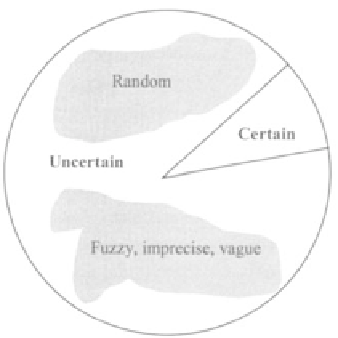Geoscience Reference
In-Depth Information
Ross (1995) illustrated in a diagram (Fig. 2.1) that the presence of uncertainty in a
typical problem is much larger compared to the presence of certainty. The collection of
all information in this context is termed as the “information world” (represented by the
circle in Fig. 2.1). If the uncertainty is considered in the content of this information, only
a small portion of a typical problem might be regarded as certain or deterministic. The
rest inevitably contains uncertainty that arises from the complexity of the system, from
ignorance, from chance, from various classes of randomness, from imprecision, from lack
of knowledge, from vagueness and so forth.
Figure 2.1.
Certainty and uncertainty in the information world (source: Ross,
1995).
In this thesis, “types of uncertainty” are distinguished from “sources of uncertainty”.
The former is attached to the semantics and to measures with which the uncertainty in a
body of information is characterised and quantified. The latter is used specifically in the
context of modelling engineering systems to classify the sources that cause the
uncertainty. Some of the classifications from the literature for the types of uncertainty are
presented in Subsection 2.2.1. Sources of uncertainty in the context of flood forecasting
are presented in Subsection 2.2.2.
2.2.1
Types of uncertainty
Various theorists in the field of uncertainty have proposed their own classifications for
uncertainty. These all testify to the many faces of uncertainty and also to the difficulty of
applying semantic classification to such an abstract concept (Hall, 1999). The more
elaborate classifications endeavour to make subtle distinctions between different types of
uncertain information. These are distinctions that may well be apparent in the minds of
the authors but are not always well captured by the semantic labels attached to them. On
the other hand, the less complex classifications have the attraction of simplicity (which is
essential if key concepts are to be communicated to the practitioners) but may not do

Search WWH ::

Custom Search